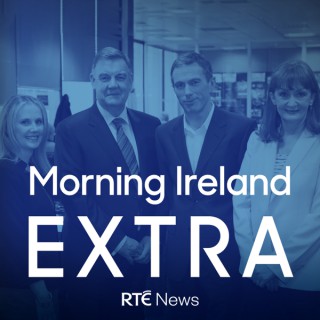Podcasts about british eu
- 9PODCASTS
- 12EPISODES
- 37mAVG DURATION
- ?INFREQUENT EPISODES
- Jul 18, 2024LATEST
POPULARITY
Best podcasts about british eu
Latest news about british eu
- Northern Ireland protocol: what is the UK and EU’s standoff about? Brexit | The Guardian - Jun 15, 2022
Latest podcast episodes about british eu
European leaders have descended on Blenheim Palace with Keir Starmer promising a 'reset' in British-EU relations. But what will that look like in practice?To analyse Britain's future relationship with Europe, an arch-Remainer and a leading Brexit figure go head to head on the Daily T - former Downing Street director of communications Sir Craig Oliver and Lord Frost, Boris Johnson's Brexit negotiator.Plus, a damning report from the Covid Inquiry has found that ministers “failed their citizens” by preparing for the wrong pandemic. The inquiry's chair Baroness Hallett says failure to plan properly led to more deaths and greater costs to the economy, and that the UK will face “immense suffering” if it is not better prepared for the next pandemic, Camilla and Kamal react to the report with chief reporter Robert Mendick outside the Inquiry. And, should men wear ties in the House of Commons?Producers: Georgia Coan and Lilian FawcettSenior Producer: John CadiganExecutive Producer: Louisa WellsPlanning Editor: Venetia RaineyVideo Producer: Luke GoodsallStudio Operator: Meghan SearleSocial Media Producer: Niamh WalshEditor: Camilla TomineyOriginal music by Goss Studio Hosted on Acast. See acast.com/privacy for more information.
Thursday 11th May 2023. World News. Today: Pakistan army. ASEAN Myanmar. Papua officials criticised. Sudan fighting. Congo landslide. Tunisi
SOUND NOTE: We had some technical difficulties, that meant that the sound quality of today's recording is not as good as normal. Sorry about that. We will be back to normal tomorrow!World News in 7 minutes. Thursday 11th May 2023.Support us and read the transcripts at send7.org/transcriptsToday: Pakistan army. ASEAN Myanmar. Papua officials criticised. Sudan fighting. Congo landslide. Tunisia shooting. Guinea protests. Venezuela banana virus. US migration law. British EU laws. Spain heat. Serbia amnesty. Pope address.Please leave a rating on Apple podcasts or Spotify.With Juliet Martin.Contact us at podcast@send7.org or send an audio message at speakpipe.com/send7If you enjoy the podcast please help to support us at send7.org/supportSEND7 (Simple English News Daily in 7 minutes) tells the most important world news stories in intermediate English. Every day, listen to the most important stories from every part of the world in slow, clear English. Whether you are an intermediate learner trying to improve your advanced, technical and business English, or if you are a native speaker who just wants to hear a summary of world news as fast as possible, join Stephen Devincenzi, Namitha Ragunath and Juliet Martin every morning. Transcripts can be found at send7.org/transcripts. Simple English News Daily is the perfect way to start your day, by practising your listening skills and understanding complicated stories in a simple way. It is also highly valuable for IELTS and TOEFL students. Students, teachers, and people with English as a second language, tell us that they listen to SEND7 because they can learn English through hard topics, but simple grammar. We believe that the best way to improve your spoken English is to immerse yourself in real-life content, such as what our podcast provides. SEND7 covers all news including politics, business, natural events and human rights. Whether it is happening in Europe, Africa, Asia, the Americas or Oceania, you will hear it on SEND7, and you will understand it. For more information visit send7.org/contactThis show is part of the Spreaker Prime Network, if you are interested in advertising on this podcast, contact us at https://www.spreaker.com/show/4907677/advertisement
Where to for Govt formation? (00:08); Council blocks Galway2020 funding (08:20); British EU officials re-badge as Irish (12:28); Facebook delays dating service (18:17); HIQA on maternity services (24:05); Alliance on sacking of Julian Smith (31:05); Victim of homophobic attack (35:49); Funeral of Mulready Woods (42:14); Valentine's Day (44:42)
Episode 6: British EU Agencies, Spanish Coalition Building & Juncker's Hate List
Previously in Europe, British European Union Agencies. On this week's episode we discuss the two EU agencies in the UK and who wants them and why. Also the continuing political stalemate in Spain and Juncker's little black book of hate. We also touched on the Armenian hostage situation, the new British commissioner, a right to broadband and Kosovo's first olympics. The music for this episode is L'air De Paris from France Feel free to send us an email at PreviouslyInEurope@gmail.com or follow us on twitter @PrevInEurope If you can please leave us a review on iTunes and if you can't do that tell a friend, this stuff really helps us out
ECFR's World in 30 Minutes: Brexit - Views from Europe
ECFR’s director Mark Leonard presents the discussion “Brexit - Views from Europe“ which was held at ECFR’s Annual Council Meeting in the Hague earlier this week. The panelists are Gordon Bajnai, former Prime Minister of Hungary, Norbert Röttgen, Chairman of the Committee on Foreign Affairs in the German Bundestag, George Soros, Founder and Chairman of the Open Society Foundations, Alexander Stubb, former Prime Minister of Finland, Helle Thorning-Schmidt, CEO at Save the Children International, and Gideon Rachman, Chief Foreign Affairs Columnist at the Financial Times. They look at what other EU countries can learn from the British EU referendum and what the future shape of Europe will be. It was recorded on the 28 June 2016. Readings: The world according to Europe’s insurgent parties: Putin, migration, and people power by Susi Dennison and Dina Pardijs. You can find more audio and video recordings from the Annual Council Meeting here on our website.
Roger is back interviewing his brother Neil in the wake of the British EU referendum. Today they're looking into the special case of Northern Ireland and the sneaky influence media have had in the British decision. The Troubles A Wikipedia article on the background of the Northern Irish conflict, to read up on history, as Neil recommended. Debunking years of tabloid claims about Europe The Economist has looked into the propagation of EU-myths in British newspapers.
Today Peter has a special guest to discuss the result of the British EU referendum. Neil Charlton, political scientist and British civil servant for many years joins this special episode to give us some highly up-to-date insights into what happened in Britain the other night. How did UK end up voting to leave the European Union? The first of three articles from the Guardian having an even deeper look into the circumstances of the referendum. Nicola Sturgeon says second Scottish referendum 'highly likely' – as it happened This second article deals with the first consequences arising. UK votes to leave EU after dramatic night divides nation The third article deals with the rift that is going to keep the British society divided for quite a while.
ECFR’s World in 30 Minutes: The British EU referendum
ECFR’s director Mark Leonard speaks with Sunder Katwala, director of the think-tank British Future, about the EU referendum, the recent poll swings and what the result might be. The podcast was recorded on 21 June 2016. Bookshelf: How (not) to talk about Europe by Sunder Katwala and Steve Ballinger This blessed plot – Britain and Europe from Churchill to Blair by Hugo Young Jo Cox’s Fund https://www.gofundme.com/jocox Picture: Flickr/Abi Begum
ECFR’s World in 30 Minutes: The Austrian presidential elections, and the British referendum
ECFR’s director Mark Leonard first speaks with Burkhard Bischof, editor of the Austrian newspaper Die Presse, and Caroline de Gruyter, correspondent from the Dutch newspaper NRC Handelsblatt, about the Austrian presidential elections, in which the far-right party FPÖ is the favourite to win. In the second half of the podcast Mark Leonard speaks with Douglas Alexander, Senior Fellow at Harvard University's Kennedy School and former Shadow Foreign Secretary, about the parallels between the British EU referendum and the Scottish referendum. Picture: Flickr/Yellow.Cat
Recorded on 15th June 2010, the European Studies Centre, St Antony's College presents The Chancellor of the University of Oxford Lord Patten of Barnes in conversation with Lord Hannay and Sir Stephen Wall. Convenor: Professor Jane Caplan.
Recorded on 15th June 2010, the European Studies Centre, St Antony's College presents The Chancellor of the University of Oxford Lord Patten of Barnes in conversation with Lord Hannay and Sir Stephen Wall. Convenor: Professor Jane Caplan.












